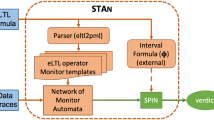Abstract
Statically analyzing real-time systems normally involves a high degree of pessimism, but it is necessary in systems requiring 100% guarantee. However, lots of less critical systems would significantly benefit from combining such static analysis with empirical tests. Empirical tests are based on observing the system at run time and extracting information about its temporal behavior. In this sense, this paper presents a generic and extensible framework that permits the extraction of temporal properties of real-time systems by analyzing their run-time traces. The analysis is based on event-recognition finite state machines that compute the temporal properties with a computational cost of O(1) per observed event in most of the cases. The framework is instantiated in order to extract some typical temporal properties (such as computation time or response time of tasks), which can serve as a template to define new ones. Finally, the paper also shows how the framework can be implemented on a real system, exclusively using state-of-the-art technology; in particular, the Trace and Real-Time Extensions of the POSIX standard.
Access this chapter
Tax calculation will be finalised at checkout
Purchases are for personal use only
Preview
Unable to display preview. Download preview PDF.
Similar content being viewed by others
References
1003.13-1998 IEEE Standard for Information Technology–Standardized Application Environment Profile (AEP)—POSIX
 Realtime Application Support [0- 7381-0178-8]
Realtime Application Support [0- 7381-0178-8] 1003.1TM Standard for Information Technology—Portable Operating System Interface (POSIX
 ). IEEE Std. 1003.1-2001, Open Group Technical Standard Base Specifications, Issue 6
). IEEE Std. 1003.1-2001, Open Group Technical Standard Base Specifications, Issue 6 Alur, R., Dill, D.L.: A Theory of Timed Automata. Theoretical Computer Science 126(2), 183–236 (1994)
Auguston, M.: Program Behavior Model Based on Event Grammar and its Application for Debugging Automation. In: Proc. of the 2nd Intl. Workshop on Automated and Algorithmic Debugging, Saint-Malo, France (May 1995)
Bartussek, A.W., Parnas, D.L.: Using traces to write abstract specifications for software modules. UNC Rep. TR 77-012, Univ. North Carolina, Chapel Hill (1977)
Bates, P.: Debugging heterogeneous distributed systems using event-based models of behavior. ACM TransactIons on Computer Systems 13(1), 1–31 (1995)
Brookes, S.D., Hoare, C.A.R., Roscoe, A.W.: A Theory of Communicating Sequential Processes. Journal of the ACM 31(3), 560–599 (1984)
Klein, M.H., Ralya, T.: An analysis of input/output paradigms for real-time systems. Technical Report, Software Engineering Institute. CMU/SEI- 90-TR-19 (1990)
McLean, J.: A formal method for the abstract specification of software. Journal of the ACM 31(3), 600–627 (1984)
Stewart, D.B., Schmitz, D.E., Khosla, P.K.: The Chimera II real-time operating system for advanced sensor-based control applications. IEEE Transactions on Systems, Man, and Cybernetics 22(6), 1282–1295 (1992)
Terrasa, A., Pachés, I., Gacría-Fornes, A.: An Evaluation of the POSIX Trace standard implemented in RT-Linux. In: Proc. of the 2001 IEEE Intl. Symposium on Performance Analysis of Systems and Software, Tucson (AZ), pp. 30–37 (2001)
Wang, Y., Parnas, D.L.: Simulating the behaviour of software modules by trace rewriting. In: Proc. of the 15th Intl. Conference on Software Engineering, Baltimore (MA), May 1993, pp. 14–23 (1993)
Yodaiken, V.: An RT-Linux Manifesto. In: Proc. of the 5th Linux Expo, Raleigh, North Carolina (May 1999)
Author information
Authors and Affiliations
Editor information
Editors and Affiliations
Rights and permissions
Copyright information
© 2004 Springer-Verlag Berlin Heidelberg
About this paper
Cite this paper
Terrasa, A., Bernat, G. (2004). Extracting Temporal Properties from Real-Time Systems by Automatic Tracing Analysis. In: Chen, J., Hong, S. (eds) Real-Time and Embedded Computing Systems and Applications. RTCSA 2003. Lecture Notes in Computer Science, vol 2968. Springer, Berlin, Heidelberg. https://doi.org/10.1007/978-3-540-24686-2_29
Download citation
DOI: https://doi.org/10.1007/978-3-540-24686-2_29
Publisher Name: Springer, Berlin, Heidelberg
Print ISBN: 978-3-540-21974-3
Online ISBN: 978-3-540-24686-2
eBook Packages: Springer Book Archive





 Realtime Application Support [0- 7381-0178-8]
Realtime Application Support [0- 7381-0178-8]  ). IEEE Std. 1003.1-2001, Open Group Technical Standard Base Specifications, Issue 6
). IEEE Std. 1003.1-2001, Open Group Technical Standard Base Specifications, Issue 6